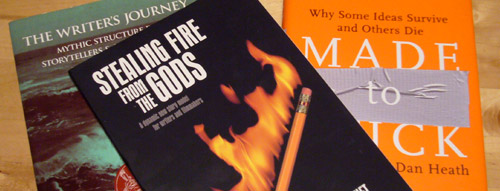
I love movies. Always have. And every great movie, whether it’s a big Hollywood production or an indie cult classic starts with a great screenplay. The script is what attracts talent and investment, inspires genius, and ultimately just tells a great story worth watching.
And there’s a formula to storytelling that makes great movies great. A formula that never fails to rise to the challenge because it educates and entertains by grasping at the very roots of the human condition.
That formula is classical mythological story structure. And it’s allowed stories like Homer’s Odyssey to persevere for literally thousands of years. And you can play with the formula quite a bit. After all, it’s just a framework.
But there are some key ingredients you have to have to make a great screenplay. No matter what the genre, you’ll find that the best movies have these things. And the worst, don’t.
The Key Ingredients in Great Screenwriting
1. The Extraordinary Hero
Typically, you can either put an ordinary character into extraordinary circumstances or vice-versa. But there has to be something compelling here. Something interesting, new, different. There’s a reason your hero is the “chosen one”.
Your hero has to stand out. They have to have some special quality, trait, or skill that will be a great asset in the quest ahead. And your audience has to recognize it. If they don’t get it, if they don’t understand it, all is lost.
Your hero can be, for the most part, very ordinary. But there’s a glimmer there. A spark. Something extraordinary.
2. You Need an Anima
Usually, your anima (or animus) is a love interest, but not always. Your anima is the second half of your hero. She or he is a partner, a mentor, a conscience, and most importantly, a reason to move forward.
It’s the anima that enables your hero to grow and become better by helping him see something inside himself he didn’t know was there. The relationship between the hero and anima is the heart of the human experience.
3. The First Twist into the Second Quest
Of course there’s some kind of quest or mission or goal. It’s what the movie is about.
But there has to be two quests. This is a critical part of storytelling that many screenwriters leave out. You know those movies that seem to be over before they even get going … they have no second quest.
The transition from the first quest to the second is the first big twist in the movie. Your hero needs to realize that the first quest was a false one. Everything he thought was wrong. He was on the wrong path. Discovering and embarking on the second quest is where your hero grows.
It’s the point where your hero becomes worthy and can see the truth.
And the transition should be a twist in the plot that you can’t see coming. Some secret is learned. The veil is pulled back. We become enlightened. This is where the audience finds renewed life, and they start cheering “alright, here we go!”
4. The Outcome and Final Twist
The outcome is where your hero triumphs during the big climax and then rides off into the sunset. But just as important is the final twist.
Most horror movies are really weak in the final twist department. They usually just throw in a shot showing us the monster is still alive. What you really want to do is build the final twist into the story and make it part of the final climax. That’s what makes the final twist all powerful.
Mythological Story Structure
You can learn more about screenwriting and storytelling from great books such as The Writer’s Journey, Stealing Fire from the Gods, and Made to Stick.
Most people know there needs to be some kind of quest or journey and that a twist at the end is good. But there are two quests in a great story, and two major plot twists. Watch your favorite movies and find them.
Cut.
That’s a wrap.

hi…
i heard that every year hollywood takes a quest to find the best screenplay from all around the word…is it true?
if it is..when it’s gonna happen?